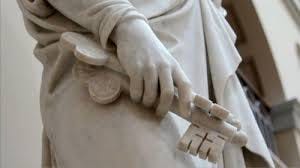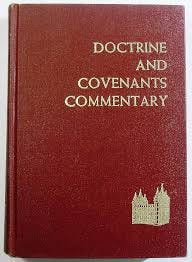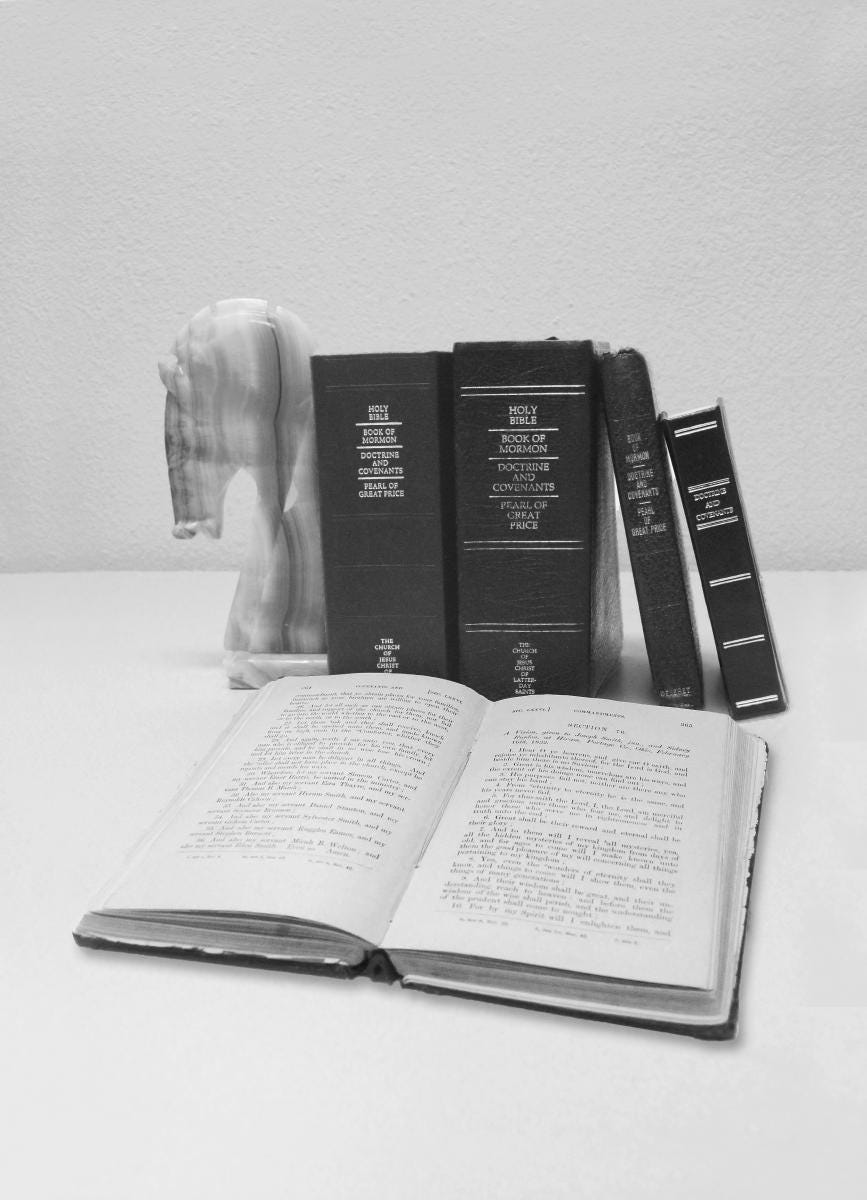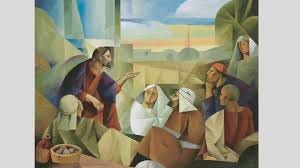Stewards over the Revelations and Commandments
Historical Background and Reflections on Doctrine and Covenants Section 70
What is the historical background for Doctrine and Covenants Section 70?
This is Bruce R. McConkie’s Section heading for D&C 70:
Revelation given through Joseph Smith the Prophet, at Hiram, Ohio, November 12, 1831. The Prophet’s history states that four special conferences were held from the 1st to the 12th of November, inclusive. In the last of these assemblies, the great importance of the revelations that would later be published as the Book of Commandments and then the Doctrine and Covenants was considered. This revelation was given after the conference voted that the revelations were “worth to the Church the riches of the whole Earth.” Joseph Smith’s history refers to the revelations as “the foundation of the Church in these last days, and a benefit to the world, showing that the keys of the mysteries of the kingdom of our Savior are again entrusted to man.”
The foundation of the Church in these last days… that’s a big deal. The phrase “a benefit to the world” reminds me that these revelations were given through the Prophet Joseph Smith who was also a seer, and that the gift of seership constitutes a great benefit to the world:
And Ammon said that a seer is a revelator and a prophet also; and a gift which is greater can no man have, except he should possess the power of God, which no man can; yet a man may have great power given him from God.
But a seer can know of things which are past, and also of things which are to come, and by them shall all things be revealed, or, rather, shall secret things be made manifest, and hidden things shall come to light, and things which are not known shall be made known by them, and also things shall be made known by them which otherwise could not be known.
Thus God has provided a means that man, through faith, might work mighty miracles; therefore he becometh a great benefit to his fellow beings. (Mosiah 8:16-18)
In connection with the gift of seership that Joseph Smith was given, and the foundation of the Church in these last days which he and his associates were instrumental in establishing, it is significant that Joseph Smith’s history emphasizes once again “the keys of the mysteries of the kingdom of our Savior” that had been entrusted to him. Without the gift of seership, without the revelations and commandments and the Book of Mormon, and without the keys of the kingdom, there would be no Church of Jesus Christ upon the earth today, only the seemingly endless proliferation of Christian sects, denominations, creeds, and traditions.
In their Doctrine and Covenants Commentary, Smith and Sjodahl introduce this section as follows:
This Revelation also contains instructions concerning the publication of the book of Commandments and Revelations. At the Conference held at Hiram, November 12th, 1831, the Saints, by vote, expressed their appreciation of that work, whereupon the Prophet suggested that Oliver Cowdery and John Whitmer, who were about to leave for Independence with the priceless manuscript (Sec. 69:1, 2), be dedicated to the Lord by prayer. He also suggested that the Church grant Sidney Rigdon, Oliver Cowdery, Martin Harris, and himself some compensation for their labors in the Church. “I feel,” said he, “that it will be according to the mind of the Spirit, for by IT these things were put into my heart which I know to be the Spirit of Truth.” The Conference decided that the Prophet should dedicated the manuscript and the two Elders who had charge of it; also that Joseph Smith, Oliver Cowdery, John Whitmer, and Sidney Rigdon be appointed a committee to manage the publication in accordance with the laws of the Church and the commandments of God; and, further, that the families of Joseph Smith, Hyrum Smith, Peter Whitmer, Christian Whitmer, Jacob Whitmer, Hiram Page, and David Whitmer, who had administered to their wants, and also Sumuel H. Smith, Peter Whitmer, Jr., William Smith, and Don Carlos Smith, for labor performed, be remembered to the Bishop in Zion as worthy of inheritances there. See Hist. of the Church, Vol. I., pp. 235-6.
It was about this time that the Revelation in the present Section was received, in which our Lord (1) appoints a committee to manage the business connected with the printing of the Commandments and Revelations (1-5); (2) instructs this committee concerning the disposition of the proceeds (6-14); and (3) assures them of His favor (15-18). (p. 419)
In his book The Revelations of the Prophet Joseph Smith, Lyndon W. Cook provides a more substantial (and lengthy) account of the historical background for this section:
Date. November 1831 (After 12 November).
Place. Kirtland, Geauga County, Ohio.
Historical Note. Section 70 is a revelation directed specifically to members of the Literary Firm. This firm, organized in November 1831, concerned itself with the printing of official Church literature. On 12 November 1831, the last day of the Hiram, Ohio conferences, it was decided that inasmuch as Joseph Smith, Oliver Cowdery, Sidney Rigdon, John Whitmer, and Martin Harris had played such a conspicuous role in recording, preserving, and preparing the revelations for publication, they should “have claim on the Church for recompense.” It was therefore voted by those present that the above-named brethren “be appointed to manage [the sacred writings] according to the laws of the Church and the Commandments of the Lord.” These men who were to “manage” the revelations constituted the membership of the Literary Firm. Members of the partnership were consecrated in their respective responsibilities, and the profits from the sale of the Church publications were to benefit both the individual members as well as the Church at large. Items of specific concern for the Literary Firm were the printing and distribution of
the New Translation of the Bible
the Church hymnal
the Church almanac
children’s literature
Church newspapers
At the organization of the Literary Firm (mid-November 1831), William W. Phelps was included as a member, and shortly thereafter Jesse Gause was added. In 1833 Frederick G. Williams, who had replaced Gause in the presidency of the High Priesthood, also became a member. Phelps’s appointment was natural because he was an experienced newspaper editor and earlier had been designated as a “printer unto the Church.” Harris’s selection as a charter member of the firm appears to have stemmed from his earlier financial assistance in the printing of the Book of Mormon, but his role in the Literary Firm cannot be determined, though, no doubt, his contribution was monetary, not literary. The appointments of Gause and Williams were related to their position in the presidency.
In September 1831, nearly two months before the creation of the Literary Firm, Phelps had been directed to purchase a printing press and type in Cincinnati on his return to Independence. Leaving Kirtland about mid-October, he obtained the printing apparatus and reached western Missouri no later than December 1831. In last November 1831 Oliver Cowdery and John Whitmer also left for Missouri taking manuscript copies of the revelations for printing. It had been decided at the Hiram, Ohio, conferences that 10,000 copies of the Book of Commandments would be printed in Independence. The cose of such an undertaking, however, later proved prohibitive, and the number was reduced to 3,000 - to be sold unbound. The first product of the Literary Firm was The Evening and the Morning Star, printed under the firm name of W. W. Phelps & Co. In February 1832 Phelps issued the prospectus of the monthly, which commenced in June 1832. Just weeks before issuing the first number, the Independence printing office had been dedicated by Edward Partridge for the purpose of spreading divine “truths & revelations in these last days to the inhabitants of the earth.”
In March 1832 a companion firm, known as the United Firm, was organized in Ohio. It was determined that where possible, proceeds of the United Firm were to assist in the operation of the Literary Firm.
Although by December 1832 the Book of Commandments was in the press, the May 1833 Evening and Morning Star lamented the delay in its completion:
“[It] will be published in the course of the present year, at from 25, to 50 cents a copy. We regret that in consequence of circumstances not within our control, this book will not be offered to our brethren as soon as was anticipated. We beg their forebearance, and solicit an interest in their prayers, promising to use our exertions with all our means to accomplish the work.”
It will be remembered, of course, that the Church press in Missouri was destroyed by a mob on 20 July 1833 (during the printing of the Book of Commandments), but members of the firm were determined to start again. Nine days after the printing office had been razed, W. W. Phelps affirmed, “Although the enemy has accomplished his design in demolishing the Printing establishment They cannot demolish the design of our God, for his decrees will stand & his purposes must be accomplished.”
Within seven weeks of the destruction of the Missouri press, arrangements were being made to establish another at Kirtland. As a matter of fact, plans for the erection of a printing office at Church headquarters in Kirtland had preceded any knowledge of trouble with the Church press at Independence. A revelation received on August 1833 directed the Saints at Kirtland to establish a printing office for printing the new translation of the Bible. In October of the same year Church leaders agreed to proceed with the construction of the office, but work must have been delayed until the following spring because the wood-frame structure was not completed until the latter part of November 1834. The building, erected adjacent to the Kirtland Temple (then under construction), was occupied upon completion, when the printing materials were moved into the upper story.
At a meeting of the Literary Firm in Kirtland on 11 September 1833 it was decided that the Kirtland “press be established and conducted under the firm of F. G. Williams & Co.” Other resolutions were that the firm should continue to print The Evening and the Morning Star at Kirtland and start a new paper entitled the Latter-day Saints’ Messenger and Advocate. On 10 October 1833, with $800, Oliver Cowdery left for New York to purchase the new press. When he returned, in the latter part of November, all haste was made to ready the equipment for printing, and by 18 December 1833 proof sheets of the Star had been printed.
By November 1833 members of the firm had decided to expand their operation to include a political paper that would support Andrew Jackson’s administration. Although initial plans suggested that the paper commence in January 1834, other pressures postponed its publication until the following year. This political paper, entitled the Northern Times, began officially in February 1835 and continued for more than a year.
By divine command, administrative changes occurred in the Literary Firm in April 1834. Although membership in the company was not altered, Oliver Cowdery and Frederick G. Williams were given direct responsibility for the printing and distribution of the Church literature. In October the first number of the Latter-day Saints’ Messenger and Advocate appeared, and reprints of the Missouri Star began in January 1835.
The year 1835 was particularly busy for members of the firm. In May both Phelps and John Whitmer arrived in Kirtland from Missouri. Immediately Whitmer was appointed editor of the Messenger and Advocate, and Phelps was assigned to help with the new edition of the Doctrine and Covenants (and later with the hymnbook), By June 1835 the Doctrine and Covenants was in the press; by August it was ready for binding. In mid-September 1835 the first copies were received from the Cleveland binder and sold at $1 each. The final item on the 1835 agenda for the firm was the printing of the hymnbook. Phelps took primary responsibility for the book, which although dated 1835, was not completed until about February 1836.
Heavy operating expenses (the firm was issuing three monthly newspapers, as well as having printed and bound the Doctrine and Covenants) brought the partnership to the brink of collapse by the fall of 1835. Samuel H. Smith and David Whitmer were appointed agents for the firm on 16 September 1835 to assist in selling subscriptions and collecting subscription monies. Their collections as well as a $600 loan in October 1835 temporarily saved the enterprise.
The expense incurred in binding the Doctrine and Covenants prompted members of the firm to secure materials for their own book bindery, and in November Cowdery was again sent to New York for that purpose.
In 1836 the Literary Firm began to be dissolved. After the dedication of the Kirtland Temple, Phelps and John Whitmer made preparations to return to their families in Missouri, and on 2 April 1836 they were discharged from their responsibilities as joint partners of the company. In June 1836 Frederick G. Williams also retired as a member. With Williams’s withdrawal from the company, publication of Church literature continued under the firm name of “Oliver Cowdery & Co.,” until 1 February 1837. During this period the second edition of the Book of Mormon was printed by Cowdery. Upon completion of the Book of Mormon Cowdery sold his interest to Joseph Smith and Sidney Rigdon, the two remaining members of the firm. Finally, in May 1837, Joseph and Sidney, financially unable to operate the business, sold the office, bookbindery, and contents to William Marks with contractual rights to rent or lease the equipment. Under this new arrangement two issues (October and November 1837) of a new Church paper called the Elders’ Journal appeared in Kirtland, Joseph Smith was editor; Thomas B. Marsh, publisher. But the Prophet’s trip to Far West, Missouri, in November 1837 and his permanent departure from Kirtland in January 1838 precluded the issuing of any subsequent numbers from Kirtland. Shortly after Joseph Smith’s arrival in Far West in March 1838 arrangements were made to continue the Elders’ Journal. A printing press at Far West, Missouri, had been obtained by Elisha H. Groves from Kirtland in February or March 1837. W. W. Phelps and John Whitmer, Church leaders in Missouri, had sent Groves to procure the press for their own use at Far West. (It will be remembered that both Phelps and Whitmer had been members of the Literary Firm.) Oliver Cowdery, who was at Kirtland when Groves arrived, helped him obtain the press and type and later was repaid by Phelps and Whitmer. When Cowdery sold his interest in the printing office on 1 February 1837, Joseph and Sidney gave him promissory notes for his equity. Now with Groves’s request, Cowdery asked the Prophet and Rigdon if he could take a “press & some of the type.” This they “granted him on conditions that he should give up the notes.’” Groves transported the press and printing equipment by water from Ohio to Missouri in the spring of 1837. It is clear that Phelps and Whitmer intended on issuing a paper from Far West, for in August 1837 Whitmer advised Cowdery (still in Kirtland) of their plans: “[We] have some timbered land for you, which we will let you ahve for the Press & type, when you come here we will make all things right…. I think if we are prospered we shall be enabled to issue a paper by the first of Jan. next [1838]. Though we live at a remote distance from materials & will take a long time to accomplish a little.” Following their excommunication in March 1838, Phelps and Whitmer lost interest in their printing plans. On 21 April 1838 it was decided to purchase the “printing press, type [and] all the furniture pertaining to the establishment” from John Whitmer for the purpose of printing the Elders’ Journal. Thomas B. Marsh was to be publisher. Although in early August 1838 plans were made to establish a weekly newspaper for the Saints in Caldwell and Daviess counties, the two final numbers of the Journal (July and August 1838) marked the demis of the Literary Firm after nearly seven years.
Publication Note. Section 70 was first published as section 26 in the 1835 edition of the Doctrine and Covenants. (pp. 112-117)
This is the Prophet Joseph Smith’s own introduction to what is now D&C 70:
My time was occupied closely in reviewing the commandments and sitting in conference, for nearly two weeks; for from the first to the twelfth of November we held four special conferences. In the last which was held at Brother Johnson’s, in Hiram, after deliberate consideration, in consequence of the book of revelation, now to be printed, being the foundation of the Church in these last days, and a benefit to the world, showing that the keys of the mysteries of the kingdom of our Savior are again entrusted to man; and the riches of eternity within the compass of those who are willing to live by every word that proceedeth out of the mouth of God - therefore the conference voted that they prize the revelations to be worth to the Church the riches of the whole earth, speaking temporally. The great benefits to the world which result from the Book of Mormon and the revelations which the Lord has seen fit in His infinite wisdom to grant unto us for our salvation, and for the salvation of all that will believe, were duly appreciated; and in answer to an inquiry, I received the following: [Section 70, follows] (HC 1:235-36, November 1831, Kirtland, Ohio.) (Roy W. Doxey, Latter-day Prophets and the Doctrine and Covenants, Vol. 1., p. 554)
With this historical background in mind, let’s examine and appreciate the Lord’s revelation given through His servant Joseph Smith the Prophet in D&C 70:
Behold, and hearken, O ye inhabitants of Zion, and all ye people of my church who are afar off, and hear the word of the Lord which I give unto my servant Joseph Smith, Jun., and also unto my servant Martin Harris, and also unto my servant Oliver Cowdery, and also unto my servant John Whitmer, and also unto my servant Sidney Rigdon, and also unto my servant William W. Phelps, by the way of commandment unto them.
For I give unto them a commandment; wherefore hearken and hear, for thus saith the Lord unto them—
I, the Lord, have appointed them, and ordained them to be stewards over the revelations and commandments which I have given unto them, and which I shall hereafter give unto them;
And an account of this stewardship will I require of them in the day of judgment.
Wherefore, I have appointed unto them, and this is their business in the church of God, to manage them and the concerns thereof, yea, the benefits thereof. (D&C 70:1-5)
One man, the Prophet Joseph Smith, was foreordained to receive revelations from the Lord for His Restored Church in the last days, but several men, including Martin Harris, Oliver Cowdery, John Whitmer, Sidney Rigdon, and W. W. Phelps, were foreordained to be stewards over the revelations and commandments, past, present, and future, to publish them, to manage them, and do with them as the Lord commanded.
It is awe inspiring and nothing short of miraculous to consider the sheer amount of revelations that flowed through the Prophet Joseph Smith. His scribes and the stewards of the revelations could hardly keep up. In 1831, the Prophet Joseph Smith was only 26 years old. By the age of 26, Joseph had already produced most of the revelations that form the foundation of the Restored Church of Jesus Christ, including the Book of Mormon, half of the Doctrine and Covenants, and much of the inspired translation of the Bible. It was a veritable flood of light and truth, and the Lord called His other servants to help manage, publish, and distribute this flood of light and truth.
The stewards that the Lord appointed and ordained over the revelations and commandments were accountable to the Lord for their stewardship. The fact that we can read and study the revelations and commandments today is a testament to their faithfulness in their stewardship. As we study the Doctrine and Covenants and thank the Lord for these revelations and commandments, we can also remember to be grateful for the Prophet and the stewards of these revelations and commandments: Joseph Smith, Martin Harris, Oliver Cowdery, John Whitmer, Sidney Rigdon, and W. W. Phelps.
The authors of the LDS Come Follow Me manual pose a thought-provoking question in this regard:
I am accountable for the revelations the Lord has given.
The Lord gave certain elders the responsibility to oversee the publishing of the revelations. Even though you do not have that specific responsibility, what is your stewardship or responsibility “over the revelations and commandments”? (verse 3).
Smith and Sjodahl observe:
Stewards Appointed.
-5. To the committee appointed by the Conference the Lord adds the names of Martin Harris and W. W. Phelps (v. 1). It was an important position, for the Lord would ask them for an account of their stewardship in the day of judgment. (pp. 419-420)
The revelation in D&C 70 continues:
Wherefore, a commandment I give unto them, that they shall not give these things unto the church, neither unto the world;
Nevertheless, inasmuch as they receive more than is needful for their necessities and their wants, it shall be given into my storehouse;
And the benefits shall be consecrated unto the inhabitants of Zion, and unto their generations, inasmuch as they become heirs according to the laws of the kingdom.
Behold, this is what the Lord requires of every man in his stewardship, even as I, the Lord, have appointed or shall hereafter appoint unto any man.
And behold, none are exempt from this law who belong to the church of the living God;
Yea, neither the bishop, neither the agent who keepeth the Lord’s storehouse, neither he who is appointed in a stewardship over temporal things.
He who is appointed to administer spiritual things, the same is worthy of his hire, even as those who are appointed to a stewardship to administer in temporal things;
Yea, even more abundantly, which abundance is multiplied unto them through the manifestations of the Spirit.
Nevertheless, in your temporal things you shall be equal, and this not grudgingly, otherwise the abundance of the manifestations of the Spirit shall be withheld. (D&C 70:6-14)
Those who labor in spiritual things are worthy of their hire. The stewards of the revelations and the commandments received as much as they needed, for their necessities and their wants, and they were to return any surplus into the Lord’s storehouse. This was consecration. Everything was devoted to the building up of the Kingdom of God on the earth and the establishment of Zion, not just for their generation, but for future generations, the heirs of the Kingdom.
Furthermore, these original stewards served as an example for future stewards and for everyone who belongs to the Church of the living God. It is the law (see also here) by which members of Christ’s Church must abide. None are exempt. The Lord appoints some to administer in spiritual things and others as stewards over temporal things. Both are worthy of their hire. The temporal and the spiritual are inextricably connected in the Kingdom of God. However, the riches of those who labor in spiritual things are greater in that such receive abundantly and the abundance is multiplied through the manifestations of the Spirit. This might be another way to describe what the Lord calls “the riches of eternity.”
Is this how the Church operates today? It ought to be.
The Lord also commanded the Saints to be equal in temporal things. Are the modern Saints equal in temporal things? Hardly. To be equal in temporal things does not mean that everyone possesses the same things or the same amount of things, but that each person and family receives sufficient for his or her needs and righteous desires and the needs and righteous desires of his or her family.
We modern Saints are as unequal in temporal things as any people can be. There are many modern Saints who live in the lap of luxury, metaphorically clothed in purple and fine linen, and faring sumptuously from day to day. However, there are many other modern Saints, especially in third world countries, who live in the most abject poverty, like beggars full of sores who long to be fed with the crumbs which fall from the rich man’s table and with dogs licking their sores.
How will the Saints ever become equal in temporal things? It will not be accomplished grudgingly or by force through communist or socialist methods. In a later revelation the Lord explains how it shall be done:
I, the Lord, stretched out the heavens, and built the earth, my very handiwork; and all things therein are mine.
And it is my purpose to provide for my saints, for all things are mine.
But it must needs be done in mine own way; and behold this is the way that I, the Lord, have decreed to provide for my saints, that the poor shall be exalted, in that the rich are made low.
For the earth is full, and there is enough and to spare; yea, I prepared all things, and have given unto the children of men to be agents unto themselves.
Therefore, if any man shall take of the abundance which I have made, and impart not his portion, according to the law of my gospel, unto the poor and the needy, he shall, with the wicked, lift up his eyes in hell, being in torment. (D&C 104:14-18)
Ungrudging equality in temporal things is prerequisite to the abundance of the manifestations of the Spirit. No wonder the abundance of the manifestations of the Spirit has been withheld from the modern Saints. We are far from Zion, a society of the Pure in Heart, a people of one heart and one mind, with no poor among us. Perhaps we have something to learn from these early Saints who did their best to establish the foundations for the New Jerusalem.
Concerning the Proceeds.
-14. As to the “benefits,” these were not to be given to the Church entirely, nor to the world (v. 6), but if more were realized than the Elders in charge needed, the surplus was to be turned over to the Lord’s storehouse (v. 7), and thus become a perpetual benefit to the inhabitants of Zion (v. 8). The business part was, in other words, to be conducted in accordance with the Law of God relating to the United Order. According to that Law, all share alike; one who administers in spiritual things is “worthy of his hire” (v. 12) equal with one who manages some business, though the world generally rates business ability higher than spiritual excellence. “In your temporal things you shall be equal” (v. 14). That is the law of the Kingdom of God. (p. 420)
The revelation in D&C 70 continues and concludes:
Now, this commandment I give unto my servants for their benefit while they remain, for a manifestation of my blessings upon their heads, and for a reward of their diligence and for their security;
For food and for raiment; for an inheritance; for houses and for lands, in whatsoever circumstances I, the Lord, shall place them, and whithersoever I, the Lord, shall send them.
For they have been faithful over many things, and have done well inasmuch as they have not sinned.
Behold, I, the Lord, am merciful and will bless them, and they shall enter into the joy of these things. Even so. Amen. (D&C 70:15-18)
The Lord was and is eager to bless His Saints, to reward them for their diligence, and to provide them with security. The language of this revelation is reminiscent of the Lord’s parable of the talents. The Lord’s faithful servants shall enter into His joy and receive many blessings, and be made rulers over many things. All things belong to the Lord - food, raiment, inheritances, houses, lands, and everything else - and it is His purpose to provide for His Saints. The Lord will be merciful toward and bless those who are faithful in their stewardships and develop and increase their talents, saying unto them:
Well done, thou good and faithful servant: thou hast been faithful over a few things, I will make thee ruler over many things: enter thou into the joy of thy lord. (Matt. 25:21)
Entering into the joy of our Lord will include the joy of an inheritance in Zion and all that it entails.
An Assurance of Divine Favor.
-18. In these paragraphs the Lord says that this commandment (concerning the stewardship of the Elders named in verse 1) was given as a manifestation, or token, of God’s willingness to bless them with temporal blessings, as well as spiritual (v. 16). To those who receive temporal blessings from the Lord, and acknowledge His hand in everything, there is joy in the possession of those things; for the Earth, and the fulness thereof, are the Lord’s, the same as the heavens and their fulness. Those who can enjoy heaven can enjoy the Earth, also. (p. 421)


















